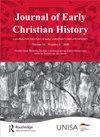Eusebius, Revelation, and Its Place in the New Testament Canon
IF 0.1
0 RELIGION
引用次数: 0
Abstract
Abstract This article examines Eusebius's treatment of the book of Revelation and its place in the New Testament canon. Puzzled scholars have proposed various interpretations as to why Eusebius placed Revelation in both “accepted” and “rejected” categories of texts provided in the Ecclesiastical History, but little persuasive consensus has emerged. To this point, most historians have approached Eusebius's treatment of Revelation not from focus on Eusebius himself so much as interest in the canon and its development. This approach has tended to impose later, more rigid ideas of canonicity upon Eusebius. Moreover, some modern readers have been quick to assume that Eusebius's politics prejudiced the bishop against Revelation with its subversive imagery. By examining other references to Revelation in Eusebius's corpus, this study argues that Eusebius is actually inclined to accept and employ Revelation alongside other accepted texts. Though his approach is critical and circumspect, in the end we need not read him—as some have insisted—as confused or subtly hostile to the Apocalypse. In addition to clarifying Eusebius's opinion of Revelation, this analysis elucidates his approach to the biblical canon generally.优西比乌、启示录及其在新约正典中的地位
摘要本文考察尤西比乌斯对《启示录》的处理方式及其在《新约》正典中的地位。困惑的学者们提出了各种各样的解释,解释为什么尤西比乌斯将《启示录》放在《教会史》中提供的“接受”和“拒绝”两类文本中,但几乎没有达成有说服力的共识。到目前为止,大多数历史学家对尤西比乌斯处理《启示录》的态度并不是关注尤西比乌本人,而是对正典及其发展的兴趣。这种方法倾向于将后来更严格的正典思想强加给尤西比乌斯。此外,一些现代读者很快就认为尤西比乌斯的政治以其颠覆性的形象使主教对《启示录》产生了偏见。通过考察尤西比乌斯语料库中对《启示录》的其他引用,本研究认为尤西比尤斯实际上倾向于接受并使用《启示》和其他被接受的文本。尽管他的方法是批判性和谨慎的,但最终我们不必像一些人坚持的那样,把他解读为对启示录的困惑或微妙的敌意。除了澄清尤西比乌斯对《启示录》的看法外,本分析还阐述了他对圣经正典的总体态度。
本文章由计算机程序翻译,如有差异,请以英文原文为准。
求助全文
约1分钟内获得全文
求助全文

 求助内容:
求助内容: 应助结果提醒方式:
应助结果提醒方式:


